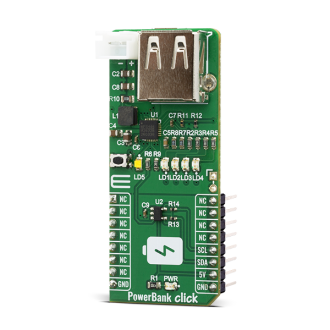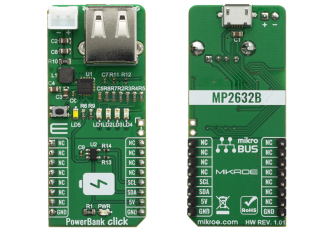
We strongly encourage users to use Package manager for sharing their code on Libstock website, because it boosts your efficiency and leaves the end user with no room for error. [more info]

Rating:
Author: MIKROE
Last Updated: 2020-04-29
Package Version: 1.0.0.0
mikroSDK Library: 1.0.0.0
Category: Battery Charger
Downloaded: 3533 times
Not followed.
License: MIT license
The Power Bank Click is a Click boardâ„¢ equipped with the MP2632B, highly integrated, flexible, switch-mode battery charger with system power-path management designed for single-cell Li-ion or Li-polymer batteries for use in a wide range of applications.
Do you want to subscribe in order to receive notifications regarding "PowerBank click" changes.
Do you want to unsubscribe in order to stop receiving notifications regarding "PowerBank click" changes.
Do you want to report abuse regarding "PowerBank click".


Library Description
The library covers all the necessary functions that enables the usage of the Power Bank click board. It offers reading from output register and calculations that result in relatively accurate measurement of connected batteries voltage.
Key functions:
uint16_t powerbank_read_data ( ); - Function is used to read raw data from MCP3221.uint16_t powerbank_read_voltage ( uint16_t v_ref ); - Function is used to calculate voltage of the connected battery.Examples description
The application is composed of three sections :
void application_task ( )
{
voltage = powerbank_read_voltage( v_ref );
WordToStr( voltage, log_txt );
mikrobus_logWrite( "Battery voltage: ", _LOG_TEXT );
mikrobus_logWrite( log_txt, _LOG_TEXT );
mikrobus_logWrite( "mV", _LOG_LINE );
mikrobus_logWrite( "------------------------", _LOG_LINE );
Delay_ms( 2000 );
}
Other mikroE Libraries used in the example:
Additional notes and informations
Depending on the development board you are using, you may need USB UART click, USB UART 2 click or RS232 click to connect to your PC, for development systems with no UART to USB interface available on the board. The terminal available in all MikroElektronika compilers, or any other terminal application of your choice, can be used to read the message.